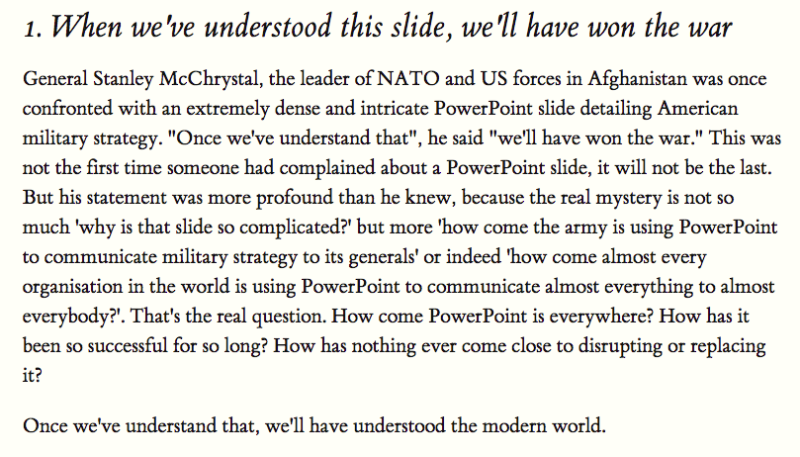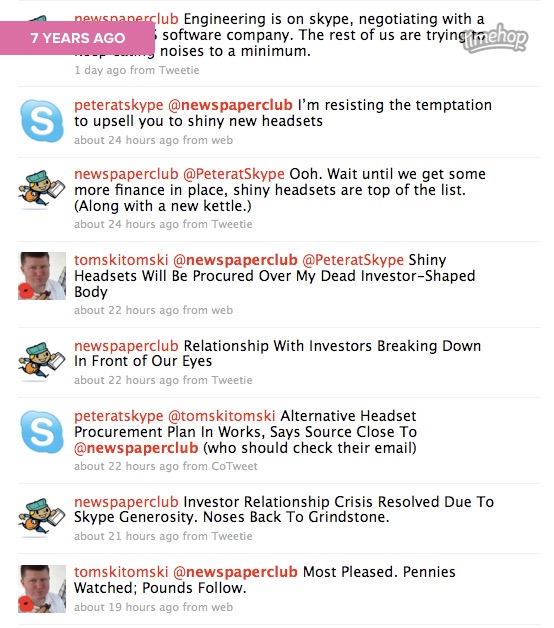Kim at Interesting. Beautiful, sad and pointful. (A perfectly cromulent word)
Russell Davies
As disappointed as you are
About | Feed | Archive | Findings | This blog by email
« October 2016 | Main | December 2016 »
Rest and motion
Further to things not changing:
"the amount of time people have spent in motion has remained constant since 1950"
from Hypermobility. via
November 19, 2016 | Permalink
What is the book but technology?
"Being opposed to technology is profoundly at odds with the book business because what is the book but technology, technology that has been smoothed and sanded by repeated contact with human society into the most comfortable technology we have, as taken for granted as our clothes, product of the looms. … We cannot know how much magnificent culture went unpublished by the white men in tweed jackets who ran publishing for the past century but just because they did publish some great books doesn’t mean they didn’t ignore a great many more."
Something seemed to cough Michal's RSS into life and this popped into my reader. It's wonderful. It's a little ways down his page, the original source seems to have gone.
November 17, 2016 | Permalink
Do simple better
Some bits from a splendid article about the Chicago Cubs.
“All combined knowledge of baseball probably represents three per cent of the game—ninety-seven per cent is unknown,” Epstein told me this spring. “So we’re constantly asking each other questions, testing hypotheses, challenging other people’s opinions—asking if there’s a better way to do things, a better way to capture data, gather data, work with data, testing out old scouting axioms to see if they can be proven by the numbers or disproven by the numbers.”
---
“I asked two quantitative people, working separately, to study the entire league and to figure out if there was a statistical way to characterize the success of other ball clubs,”
---
“Everybody wants to win, but, if all you think about is winning and losing, you get tight,” he told me. “But process is fearless. Just focus on what you have to do. Play the game properly, and the rest will take care of itself.” To underscore that point with his players, Maddon, in spring training, handed out T-shirts bearing such aphorisms as “Do Simple Better” and “Try Not to Suck.”
November 16, 2016 | Permalink
Interesting economics
When I first started doing Interesting I had no idea how much stuff cost. So I thought it might be useful to share all the economics from last time, in case anyone fancies doing something similar. It's pretty straightforward:
We sold 380 tickets at £15 each so gross revenue was £5700
Eventbrite took a fee of £767.60
The Conway Hall including PA, sound person and extra mics was £1389
There were a few misc costs: bunting, pencils, wine, a taxi, some carer time, which came to about £350.*
Which left, roughly, £3200
So, thanks to the generosity of the speakers (and to everyone who came) we donated £3200 to the Equal Community Foundation (the organisation Rujuta spoke about) and other speakers donated money to their own good causes too.
*Though, thinking about it, that doesn't include all that wine, which I also need to pay for. Which means that I've made a small loss. Ah well, it was worth it.
November 15, 2016 | Permalink
No great rush
Putting this here because I'm always looking for evidence that we're not hurtling faster and faster into the future faster than anyone's ever hurtled into the future faster and faster before etc etc. You know the kind of thing:
"Some economic historians like Robert J. Gordon actually contend that we’re not in a period of great technological innovation at all; instead, we find ourselves in a period of technological stagnation. The changes brought about by the development of information technologies in the last 40 years or so pale in comparison, Gordon argues (and this is from his recent book The Rise and Fall of American Growth: The US Standard of Living Since the Civil War), to those “great inventions” that powered massive economic growth and tremendous social change in the period from 1870 to 1970 – namely electricity, sanitation, chemicals and pharmaceuticals, the internal combustion engine, and mass communication"
The Best Way to Predict the Future is to Issue a Press Release
November 14, 2016 | Permalink
29 Bullets

I keep pondering on the question - what would a digital 'white paper' be like? And something recently reminded me of tufte.css. It's not the whole answer to the white paper question but the way it handles graphics and 'sidenotes' is interesting. So I cast about for a bit of writing that would be good to experiment with and struck on my Wired/PowerPoint thing. The idea of re-writing that in a Tufte-style was appealing so I've done that. This is the unsubbed, unedited version I originally sent to Wired so it may well be substantially different to the printed version, it may contain all sorts of mistakes. For which I obviously apologise. But I like how it works as an online piece.
November 13, 2016 | Permalink
Resonant
"We’re ruled by a cadre of senior civil servants and politicians who don’t understand technology, still think it’s a gimmick and are more concerned with building empires than delivering good services to the people of the United Kingdom.
Many civil servants lack even basic skills. Things as fundamental as knowing how to type – let alone the more advanced things they need to know to work in the 21st century. This makes them resentful of “digital” and resistant to the change that it means.
I see very little being done to support civil servants, help through this period of change to the very way they work, let alone a widespread plan to upskill them.
Pay, reward and “performance management” structures are not fit for the 21st century and are not what truly motivates people. Creative thinking, innovation and new ways of doing things are not recognised or rewarded.
And while the civil service is in this period of retrenchment I can’t do any more of the exhausting fights to gain even an inch of ground."
November 12, 2016 | Permalink
